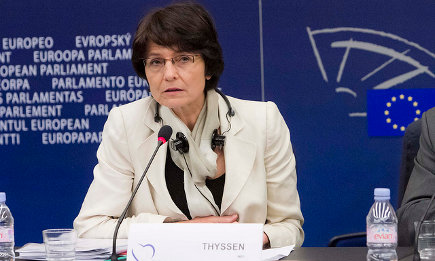Europe targets skills

The Skills Agenda is one of the most important initiatives on the Commission’s Work Programme this yea, Thussen said tot he European Parliament. “It will directly contribute to our promise to deliver on Jobs, Growth and Fairness.”
Pathway to prosperity
“Skills are a pathway to prosperity. With the right skills, people are equipped for good-quality jobs and can fulfil their potential as confident, active citizens. Also, in a fast-changing global economy, skills determine Europe’s competitiveness and the capacity to drive innovation.
Yet the situation in Europe calls for action. More than 70 million Europeans have poor reading, writing, numeracy and digital skills. One in four adults has not achieved an upper secondary qualification.
Too many people work in jobs that do not match their talents. Women represent 60% of new graduates, but their employment rate remains below that of men. At the same time, 40% of European employers have difficulty finding people with the right skills. And too few people have the entrepreneurial skills and mindsets needed to establish their own business.
Re-shaping life
Furthermore, the digital transformation is re-shaping the way we live, work, and do business and the types of skills needed. Europe faces shortages in high-level skills. And despite good employment outcomes, Vocational Education and Training is still regarded as a second choice by many. While national and regional labour markets and education and training systems encounter specific challenges, all Member States face similar problems.
The New Skills Agenda for Europe focuses on three priority areas:
-Improving skills levels and their labour market relevance across Europe;
-Making skills and qualifications easier to understand and compare across borders and economic sectors;
-Improving forecasting and understanding of skills needs now and in the future.
Basic guarantee
To step up action and not to leave anyone behind, we propose a basic skills guarantee. This is a recommendation to Member States to bring together their resources to offer low skilled people opportunities to catch up and acquire the skills that will help them to find employment, stay in work, and improve their working situation
A revision of the European Qualifications Framework will make it easier to understand and compare skills and qualifications, and facilitate work and study mobility. We are also putting forward a “Blueprint” for cooperation on skills in specific economic sectors to stimulate stakeholders to work together to identify skills needs and identify practical solutions.
Honourable members – refugees and migrants come to Europe with a diversity of skills sets that can contribute to our economies. In order to facilitate integration into the labour market, we propose a Skills Profile Tool for Third Country Nationals to help identify and document their skills, qualifications and professional experience.
Supporting memberstates and people
A red thread across our Agenda is the need to stimulate strong business-education partnerships, such as the European Pact for Youth. These partnerships also have a crucial role in promoting entrepreneurship and entrepreneurial mind sets. Other actions will follow over the next two years. Later this year, we will propose a revision of the Europass Framework to support the documentation of skills and qualifications and better skills intelligence. We count on your support for swiftly adoption when the time will come.
We will also launch a “Digital Skills and Jobs Coalition” to develop a large digital talent pool and ensure that individuals at all levels are equipped with adequate digital skills. For 2017, work in the pipeline includes a revision of the 2006 Key Competences Framework, proposals supporting the modernisation of vocational education and training, and an initiative on graduate tracking to improve information on how graduates progress in the labour market.
We can do much to support Member States with the implementation of these proposals. For the period 2014-2020, more than € 27 billion of the European Social Fund is available to support skills. Europe’s prosperity depends upon our most valuable asset – our people. In a fast-changing global economy, it is people’s skills which will be a motor for our competitiveness and growth. This Skills Agenda sets out how Europe will add value to Member States’ action and to moblise actors. Together we can unlock Europe’s full potential,” Thyssen proposed in the EP in its Strasbourg session.
Meest Gelezen
Vrouwen houden universiteit draaiende, maar krijgen daarvoor geen waardering
Wederom intimidatie van journalisten door universiteit, nu in Delft
Hbo-docent wil wel rolmodel zijn, maar niet eigen moreel kompas opdringen
‘Burgerschapsonderwijs moet ook verplicht worden in hbo en wo’
Raad van State: laat taaltoets nog niet gelden voor hbo-opleidingen

